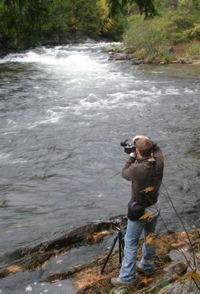
NASA photo
I used to think blogging was stupid and just for people with no life and plenty of disposable time on their hands.
What a hypocrite I was.
At least partially.
Blogging is not stupid. But bloggers must have disposable time available. I never had it when I was a student (who vigorously dedicated himself to academia while earning some cash in a part-time job or two on the side). But now that I'm a full-time employee (yes, with a real job), I have the time to waste.
So humor me, if you will.
Self-publication is a beautiful thing, especially when it comes in the form of self-promotion. But I'll try to keep that to a minimum. Blogging is a medium through which everyone can be a journalist. I consider myself a citizen journalist on The Offlede. I'm not doing this for money: I'm doing it for fun. (Note: Donations will be accepted.)
I've spent a lot of time thinking about what I wanted to do with this blog. Actually, I spend a lot of time thinking about everything. That's the problem: I waste all my time asking myself questions, but I rarely answer them promptly.
So I'm just going to wing it. I'm a journalist, and journalists have to make quick decisions. It's about time I live up to the description of my profession.
I'll try to make my work for The Offlede somewhat professional and, more importantly, partially meaningful.
That's why I'm starting with an assignment that should have great value.
More than two years ago, toward the end of August 2005, a powerful Category 3 hurricane struck the city of New Orleans and its surrounding parishes, as well as cities on the Mississippi Gulf Coast such as Biloxi and Bay St. Louis. Alabama also got hit during the storm's second landfall. Florida got nailed on the first.
A few thousand people died during Hurricane Katrina and its immediate aftermath. Scores more died of injuries - physical and psychological - suffered during the storm. Countless people survived and told of harrowing experiences in its wake. Their lives had changed forever, many for the worst.
Through periodic blog updates on The Offlede - including photographs, occasional bad videos and a few words - I will document my trip to New Orleans and record my impressions of the Crescent City. I always have been intrigued by the Big Easy and its profound Cajun culture, especially the food. And the music reminds me of home, or at least a place that was near my old stomping grounds of Down East Maine: the Maritime provinces of Canada, especially Nova Scotia. The prominence that the fiddle and accordion have in Cajun tunes trigger memories of the French Canadian music I, as a child, listened to on Canadian radio waves.
I've always wanted to visit New Orleans, even after the storm. I'm on vacation now from my real job, so this is my chance.
*** Breaking it down ***
- Assignment: A post-Katrina visit to New Orleans
- Who: Me, my two cameras, my notepad, my mechanical pencils (because they work in the rain; pens don't)
- What: Katrina's severity was downplayed by all levels of government before, during and immediately after it hit. Aid didn't pour into the city: It barely trickled. Conversely, the media hyped the death totals at first and sensationalized accounts of violence after the storm. Much of that could be attributed to poor communication infrastructure. And though they tried through spectacular accounts and horrific images, the media failed to direct the government's attention to the city at the most crucial junctures of disaster preparation and response. There was a lot of talk about the "Big One" hitting and flooding New Orleans. There was little action.
- When: 7 p.m. Dec. 19, 2007, to 10 a.m. Dec. 22, 2007
- Where: From Melbourne, Fla., to New Orleans, a 700-mile, 10-hour journey by highway (through the heart of Florida and over Interstate 10, which runs through the Panhandle and southern Alabama and Mississippi, and into New Orleans, where the road became the infamous flooded escape route for thousands of homeless New Orleanians after the storm)
- Why: New Orleans is struggling to recover. Its people are depressed. And I can't get a good picture of the tangible and emotional destruction that still lingers. I read about it in newspapers. I hear about it and see it on "60 Minutes" and CNN. Anderson Cooper, whose stardom really was a product of the storm, tries to "keep them honest." But I still have no clue about the realities. The media portrayals are mixed: a good place to visit, as violence-ridden as ever, depressing, brave, terrified. I have to see for myself.
- How: Mostly by foot, some by streetcar and bus, all with eyes wide open
Assignment NOLA home page



No comments:
Post a Comment